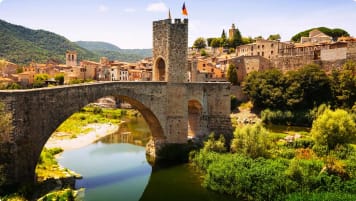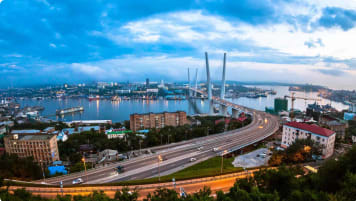Western Europe Gardens and Treasures Short Tour
Odyssey Traveller small group tour explores Paris, Honfleur and Abbeville in France, Bruges in Belgium and then Luxemborg. Travelling with like minded people to discover some of the finest gardens of Europe, like Claude Monet's garden in Giverny. We also take in a memorial service in Villers-Bretonneux, which saw the greatest sacrifice of Australian and New Zealand troops during World War I.
From A$8,445AUD
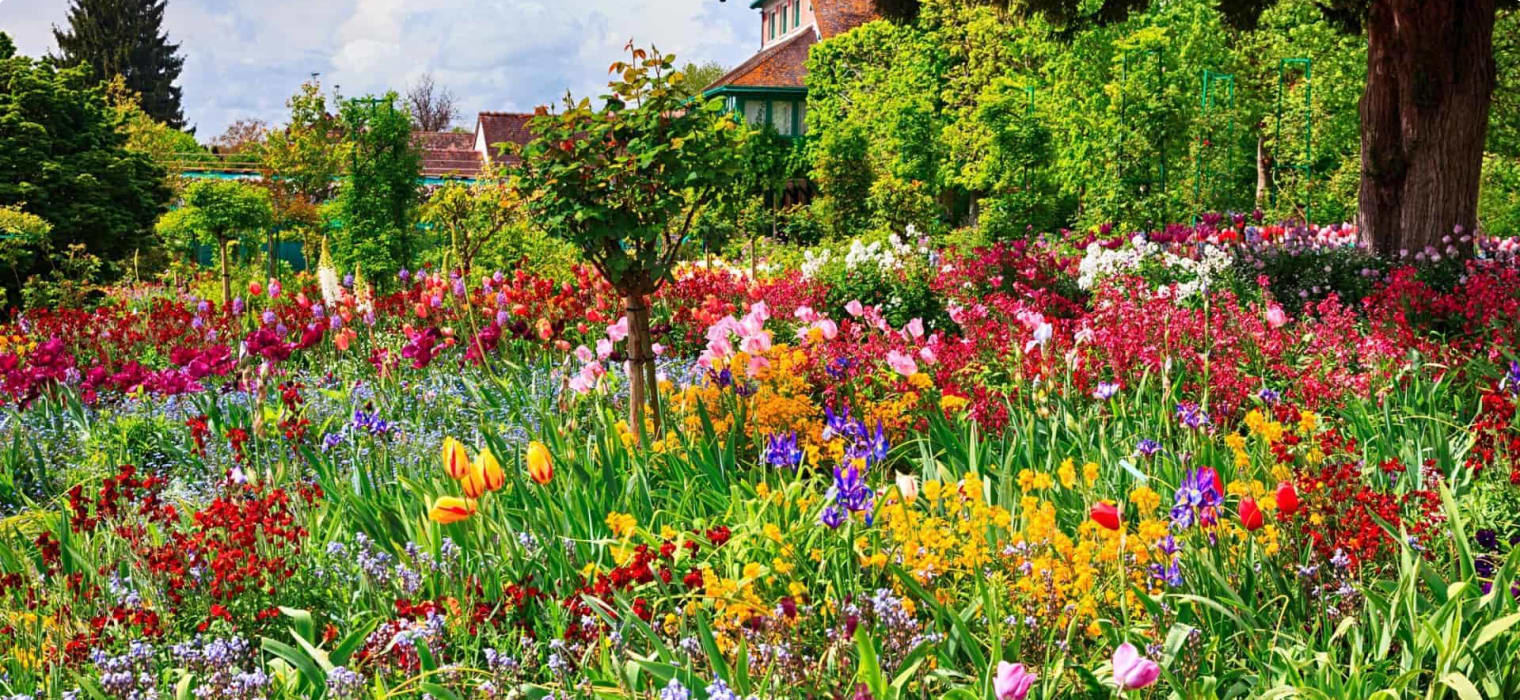
Highlights
- 1. Sample varieties of the best Belgian chocolates.
- 2. Explore one of the most beautiful medieval centres in Europe, Bruges.
- 3. Roam Monet’s Gardens, Bagatelle Rose Gardens, and the Gardens of Annevoie.
- 4. Attend a memorial service in Villers-Bretonneux.

Departure Dates
| Departure Date | Price |
|---|
Western Europe Gardens and Treasures | Small Group Tour in Europe
Odyssey offers easy, convenient, and relaxed escorted small group tours across Western Europe and beyond. We explore Belgium, Luxembourg and France’s fairy-tale natural beauty, its heritage, its World Heritage Sites, and world famous cities, all with some truly spectacular scenery along the way. This and more is all waiting to be explored on one of Odyssey’s small group tours of Belgium, Luxembourg and France, designed for the senior traveller, and led by experienced, and enthusiastic like minded people.
This short escorted tour combines visits to France, Belgium and Luxembourg. During our 13-day garden tour journey, we will discover a selection of the finest gardens and chateau x in Europe. Your knowledge is extended as professional guides share their studies of the culture and history of the places visited on gardens tour France and Western Europe Gardens and Treasures small group tour begins in Paris and ends in Luxembourg. A longer version of the tour (26 days) is also available if you would like to spend longer learning about garden design and exploring more of the finest gardens.
Paris
This Western Europe treasures and gardens small group tour begins in the pedestrian-friendly city of Paris. Here we explore Parisian arrondissements (rounded off areas or boroughs) by both foot and bus. We visit the Seine and the historic districts on the Left and Right Banks, then visit Paris gardens, starting with the Bagatelle Gardens, a landscaped garden dating back to the 18th century. Now a botanical garden of the city of Paris, it is famous for its rose garden and annual international roses contest held since 1907. We stop to view the famous Parc Andrew Citroen, a 35 acre park built on the site of the Citroen factory. If spending extra time in the city before the tour, you may wish to visit Luxembourg Garden (Jardin du Luxembourg), dating back to 1612,it covers 23 hectares and is known for its lawns, tree-lined promenades, flower garden, model sailboats on its circular basin, and picturesque Medici Fountain.
Giverny
Our next stop on this escorted tour is Giverny, where we explore Claude Monet’s house and garden. We also visit Les Andelys, where Great and Little Andelys grew towards each other over the centuries to form the present town. Given its strategic position, Richard the Lionheart, the Duke of Normandy, and the King of England built Chateau Gaillard on a cliff to protect the duchy and its capital, Rouen, from the French Crown. We also visit Harcourt, whose arboretum ranges over 25 acres and boasts a botanical collection of around 500 species. The oldest specimens date back to 200 years. The arboretum, created in 1810, surrounds a vast medieval fortress. The outer wall, moats, and facades of the fortress are still visible. Touring through these castles and palace(s) on guided tour, we begin to get a sense of how some of these French gardens were expressions of aristocracy and power.
Honfleur
We will visit Honfleur, a pivot of the Celtic Arc extending from Normandy through the west of England and Scotland. The origin of the name Honfleur comes from its Scandinavian landowner "Honna" followed by "flow". In the Nordic language this meant "cove or small estuary". The word eventually became "fjord" in Scandinavian, while in French it evolved into "fleur", which can be found in the name of many small Norman towns: Barfleur, Harfleur, and Honfleur. As early as the 11th century, Honfleur was one of the most important towns in the dukedom of Normandy.
Highlights
Other highlights of the tour include a memorial service in Villers-Bretonneux. During World War I, this saw the greatest sacrifice of Australian and New Zealand troops. Travellers on this garden tour have the chance to explore Bruges then roam through the Bagatelle Rose Gardens, and the Gardens of Annevoie. Learn from professional guides about castle of Vianden in Luxembourg. For lovers of Europe, this tour encompasses breathtaking scenery, delicious regional cuisine and some of Europe's hidden gems you might not have had a chance to visit before. Stroll through some of the world's most beautiful and remarkable gardens on this unique travel experience, accompanied by a knowledgeable local guide. This will be vacation like no other where you will gain an insight into some of the most interesting history Europe has to offer.
This is one of more than 70 small group escorted tour offered by Odyssey Travel each year. These small group tours visit some of the best places in Europe and are suited to the senior or mature couple or solo traveller.
Note: This tour was previously known as "Odyssey through the Low Countries or Treasures of Western Europe."
For more details, click the ‘Top 5’ or ‘Itinerary’ buttons above! If you’re keen to experience this tour, please call or send an email. Or, to book, simply fill in the form on the right hand side of this page.
Gallery
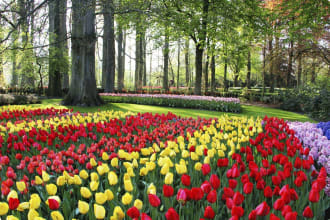
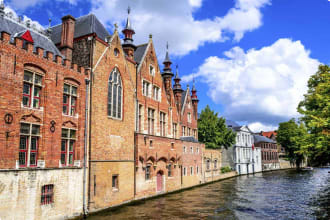
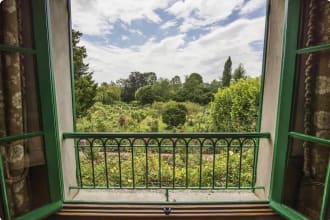

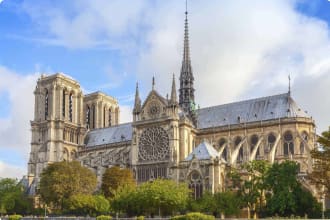


Itinerary
14 days
Day 1: Paris
Accommodation: 1 night at Le Magellan Hotel or similar.
Upon arrival in Paris we will transfer to our hotel individually. Our tour will commence with an orientation and welcome dinner.
(D)
Day 2: Paris
Accommodation: 1 night Le Magellan hotel or similar.
We will tour the pedestrian-friendly city of Paris and its arrondissements (rounded off areas or boroughs) by foot and by bus. We will explore the Seine and the historic districts on the Left and Right Banks, then visit the Bagatelle Gardens, a landscaped french garden dating back to the 18th century. Now a botanical garden of the city of Paris, it is famous for its rose garden and annual international roses contest held since 1907. We will stop to view the famous Parc Andrew Citroen, a 35 acre park built on the site of the Citroen factory.
(B)
Day 3: Honfleur
Accommodation: 2 nights at All Seasons Honfleur or similar.
Our next stop is Giverny garden, where we will explore Claude Monet’s house and garden, that inspired his water lilies paintings in the lush lily pond. We will also visit Les Andelys, where Great and Little Andelys grew towards each other over the centuries to form the present town. Given its strategic position, Richard the Lionheart, the Duke of Normandy, and the King of England built Château Gaillard on a cliff to protect the duchy and its capital, Rouen, from the French Crown.
We will also visit Harcourt, whose arboretum ranges over 25 acres and boasts a botanical collection of around 500 species, with the oldest specimens dating back to 200 years. The arboretum, created in 1810, surrounds a vast medieval fortress. The outer wall, moats, and facades of the fortress can still be seen.
We will visit Honfleur, which is one of the pivots of the Celtic Arc extending from Normandy through the west of England and Scotland. The origin of the name Honfleur comes from its Scandinavian landowner “Honna” followed by “flow” which in the Nordic language meant “cove or small estuary.” The word eventually became “fjord” in Scandinavian, while in French it evolved into “fleur”, which can be found in the name of many small Norman towns: Barfleur, Harfleur, and Honfleur. As early as the 11th century, Honfleur was one of the most important towns in the dukedom of Normandy.
(B,D)
Day 4: Honfleur
Accommodation: All Seasons Honfleur or similar.
Today we will see Cambremer and its park at Jardin du Pays d’Auge. The park consists of a well-maintained series of beautiful garden set around a 17th century farm and other buildings, as well as 2 small museums (one dedicated to old tools and the other to the boulangerie). Located a few minutes from Cambremer, we will visit Crevecoeur and its chateau, and then we will travel to Victot Pontfol, heart of the Calvados area of Normandy. We will explore the archetypical Normandy village of Beuvron-en-Auge by foot.
(B,D)
Day 5: Abbeville
Accommodation: 3 nights at Mercure Abbeville or similar.
We will visit Rouen to see the Notre Dame Cathedral, the abbey church of Saint-Ouen, Saint Maclou church, and the Normandy parliament building. We will also visit the Gros Horloge and the Aître St Maclou (the Hotel de Bourgthéroulde), which are among the finest examples of Renaissance buildings in Europe. Apart from the splendour of its architecture, Rouen is renowned for many famous historic, literary, and artistic characters, including Richard the Lionheart, Joan of Arc, Pierre Corneille, Gustave Flaubert, Guy de Maupassant and, of course, Claude Monet. Rouen is a truly a museum city. The fine arts museum is home to the second most important collection of Impressionist works in France, while the Ceramics Museum or the Secq de Tournelles metalwork museum both offer unique collections unrivaled anywhere in the world. The Natural History Museum and the Museum Gros Horloge have both recently been entirely renovated.
We will also explore Abbeville, which is a great base for our exploration of the Picardie coastline which abounds with bird sanctuaries, dunes, forests and marshlands. Despite being badly bombed during World War II, Abbeville is still full of architectural delights such as the Eglise Saint-Sepulcre, which dates back to the 15th century, and the Collegiale Saint-Vulfran, one of the oldest belfries, dating back to the 13th century. The Musee Boucher-de-Perthes is also worth a foray and has an interesting collection of prehistoric artefacts and murals.
(B,D)
Day 6: Abbeville
Accommodation: Mercure Abbeville or similar.
Villers Bretonneux in the Somme is one of the most poignant places in the world for Australians, as many Australian soldiers were deployed to the region in WWI. Given its strategic position, some historians believe the battle fought there changed the course of World War I. Local gratitude in Villers Bretonneux is particularly strong, as many Australian troops lost their lives recapturing the town from German forces. We will see the 32 metre Memorial Tower which carries the names of more than 11,000 Australian soldiers who have no known grave. We will also visit the town’s school, which was rebuilt with the help of donations from Victorian schoolchildren in the 1920s.
We will then visit Amiens, another World War I site, to see floating gardens, Jules Verne’s house, and the Art and Archaeology Museum’s extensive collection of Egyptology. We will visit the La Boiselle Lochnagar mine crater on the 1916 Somme battlefields in France, which is the largest man-made mine crater created in World War I on the Western Front. Our next stop is the village of Pozieres, another strategic location on a ridge of high ground between Albert and Bapaume. We will enjoy refreshments at Le Tommy Café with traditional English fare and reflect on our valiant countrymen.
(B,D)
Day 7: Abbeville
Accommodation: Mercure Abbeville or similar.
We will visit Bullecourt, another important site in France from WWI. Bullecourt was located on the Hindenburg Line defenses, and was attacked by Australian troops on 11 April 1917, resulting in great losses. We will also see the Thiepval Memorial, which carries the names of 72,194 officers and men of the United Kingdom and South African forces. These men died in the Somme battle sector before 20 March 1918 and have no known grave. Over 90 percent of those commemorated on the Thiepval Memorial died in the 1916 Battles of the Somme between July and November 1916.
(B,D)
Day 8: Bruges
Accommodation: 3 nights at Ter Brugge Hotel or similar.
We will see St. Valery sur Somme’s upper town, which is a fine example of a medieval citadel. The Courtgain, set behind the harbour, is where sailors lived in their little, brightly-painted, close-set cottages. We will visit the Picardie Museum, which recreates life in Picardy from before the age of the motor and displays of a score of different traditional crafts. We will also visit a herbarium (or medieval garden) next to the ramparts which has a fascinating mixture of simple flowers, rare vegetables, and of course the plants of the Picardy shore. Our next stop will be the famed gardens of Sericourt, which was the winner of the “Best Park in France 2005” prize. This large garden, which covers 4 hectares, has a series of garden “rooms” and alleys linking different areas, a delight for garden lovers. The “rose cathedral,” a massive rose tunnel, is a highlight. The geometric garden is a kind of parterre filled with hemerocallus, asters, and other perennials which are particularly beautiful in the autumn.
Next we will see Fromelles, which is another important site for Australians associated with WWI. The Australian 5th Division, along with the 61st British (South Midland) Division, attacked here on 19 July 1916. The Australian attack here was their first serious battle in France, and the only one in which they achieved no success. Our next stop is Pheasant Wood Cemetery, where the remains of 250 British and Australian soldiers were recovered. So many remains were discovered that the Commonwealth War Graves Commission (CWGC) created a new cemetery for their reburial, the first new war graves cemetery to be created by the CWGC since the end of the Second World War. We will visit Australian Memorial Park, which commemorates the bravery of those who went out to rescue the wounded of Fromelles. In the middle of the park is a statue sculpted by Peter Corlett of Melbourne which depicts Sergeant Simon Fraser. Our last visit for the day on our private tour is Hitler Bunker, which is where it is rumoured that Hitler was stationed.
(B,D)
Day 9: Bruges
Accommodation: Ter Brugge Hotel or similar.
Bruges is often considered the world’s most perfectly preserved medieval city, with its cobbled streets and tinkling carillions. Bruges is the capital and largest city in the province of West Flanders in Belgium. Bruges became one of the most prosperous cities in Europe circa 1300, but began losing its economic strength around 1500 when the Zwin Channel started silting up, preventing access to the sea. At this time people began to abandon the centre, which helped to preserve its medieval features. Today Bruges is once again a thriving community with a population of 120,000 people, and the medieval centre is one of the most beautiful in Europe.
(B)
Day 10: Bruges
Accommodation: Ter Brugge Hotel or similar.
The Belgian city of Antwerp is perhaps one of the most underrated cities in Belgium. The historic old city centre with its charming cobblestone lanes has tourist attractions such as Belgium’s most glorious cathedral, the Cathedral of Our Lady (Kathedraal), which resides on the Groenplaats. This part of Antwerp has remained unchanged for many centuries.
(B)
Day 11: Luxembourg
Accommodation: 2 nights at Park Inn by Radisson or similar.
Brussels is quickly gaining a reputation as one of Europe’s must-see destinations, with its small town charm, trendy bars and restaurants, fabulous food, great nightlife, fantastic shopping, numerous museums, and other attractions including the diverse and interesting exhibitions and festivals organised there every year. Brussels is also gaining a reputation as a mecca of style, art, and design. Home-grown Belgian designers are rapidly gaining global acclaim. The streets of Brussels feature art and architecture created from an unmistakably Belgian point of view that cannot be replicated.
We will visit Annevoie and its its extensive water garden. The castle is a chateau in the village of Annevoie-Rouillon in the municipality of Anhée. The gardens’ designer, Charles-Alexis de Montpellier, was a local iron merchant. Creating the gardens was no easy job. His first task was to dig a 400 metre long canal at the highest point of his 28 hectare grounds, and fill it with water from the nearby Fonteny spring. After that he constructed a complex network of inter-connecting underground channels running from the canal. He then had to excavate about 20 pools and ponds and adorn them with over 50 fountains, cascades, and waterfalls. It took him nearly 20 years to finish, but by 1776 Annevoie Gardens was complete, and has remained functional ever since.
(B,D)
Day 12: Luxembourg
Accommodation: Park Inn by Radisson or similar.
Luxembourg is famous for its spectacular setting on a rocky outcrop, which explains its nickname, “Gibraltar of the north.” It’s been the capital of the Grand Duchy since medieval times, and has now become a cosmopolitan shopping centre featuring prestigious European brands. Luxembourg citizens, who are very keen on maintaining a well-manicured environment, coined the slogan “Luxembourg, the green heart of Europe.” We will see the Grand Duchy of Luxembourg. So many castles dot the rural countryside that one valley has been re-christened the Valley of Seven Castles. We will visit the majestic castle of Vianden, which is just north of the valley.
(B)
Day 13: Luxembourg
Our garden holiday will conclude today after breakfast.
(B)
Tour Notes
- Group size is limited to 18.
- Itineraries may change if flight schedules, site availability, and other inclusions have to be amended prior to departure
Includes / Excludes
What’s included in our Tour
- 12 nights of hotel accommodation with breakfast.
- 12 breakfasts and 8 dinners.
- All excursions, entrance fees, and local guides.
- Transport in comfortable and modern coaches.
- Services of a tour leader for the duration of tour.
- Gratuities and necessary tips.
What’s not included in our Tour
- International airfares and departure taxes.
- Comprehensive travel insurance.
- Lunches.
- Items of a personal nature such as telephone calls and laundry.
Participants must be able to carry their own luggage, climb and descend stairs, be in good health, mobile and able to participate in 3-5 hours of physical activity per day, the equivalent of walking / hiking up to 8 kilometers per day on uneven ground.
Book now
Make it a private tour
Easing your journey
Crossing international borders with restrictions
The list of requirements to travel internationally has changed and will continue to change for several years. Odyssey is here to assist you in managing your way through these requirements:
For more information see our Crossing international borders with restrictions page.
Book With Confidence
If less than 30 days before your tour starts you are unable to travel as a result of Government travel restrictions, Odyssey Traveller will assist you with a date change, provide you with a credit or process a refund for your booking less any non-recoverable costs.
See Terms and conditions for details.
Peace of Mind Travel
The safety of our travellers, tour leader, local guide and support staff has always been our top priority and with the new guidelines for public health and safety for keeping safe for destinations around the world, we’ve developed our plan to give you peace of mind when travelling with us.
See Peace of Mind Travel for details.
Reading List Download PDF
Paradise on Earth: The Gardens of Western Europe
Gabrielle Van Zuylen
Traces the history of gardens from Mesopotamia through the cloister gardens of the Middle Ages and the labyrinths of the Renaissance up to the urban parks of today, with a listing of great European gardens and a glossary.
Claude Monet: Life and Art
Paul Hayes Tucker
This lavishly illustrated book presents the first complete overview of the life, art, and times of the quintessential Impressionist. Tucker, one of our foremost authorities on Monet, offers a striking new view of the artist, showing him to be a far more complicated figure than previously acknowledged, fiercely competitive and ambitious, as well as sensitive and inventive.
Monet's Garden: Through the Seasons at Giverny
Vivian Russell
A new paperback edition of Vivian Russell's much-admired exploration of Claude Monet's garden at Giverny. This book ventures behind the scenes to chart the history of one of the world's most famous gardens, linking the world of Monet the artist with Monet the gardener. Four chapters trace the garden through the changing seasons, paying special attention to the atmosphere and light that so preoccupied Money and became the focus of his life as a painter. Throughout, the work done by Giverny's present-day gardeners is analysed to reveal the practical techniques of maintaining the most-visited garden in the world.
History of Western Europe
James Robinson
By far one of the greatest history books ever written, James Robinson’s classic of Western European history is an absolute must-read for anyone seeking a greater understanding of the power struggles and armed conflicts that formed the Europe, and the world, of today. Spanning over a thousand years, from the stunning fall of the western Roman Empire to the rise of the German industrial/military empire on the eve of World War I, Robinson weaves a beautiful, easy to read historical narrative of the major events and figures of European history. From Philip Augustus to Prince Metternich, from Charles Martel to the Holy Roman Empire and the Papal States, James Robinson’s heavily illustrated history takes you on a journey of several lifetimes, and aims to leave you better and more informed than when you began.
Western Europe Gardens and Treasures Short Tour


